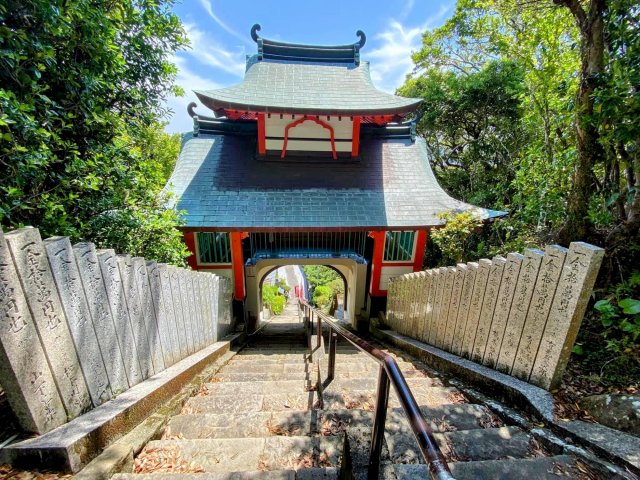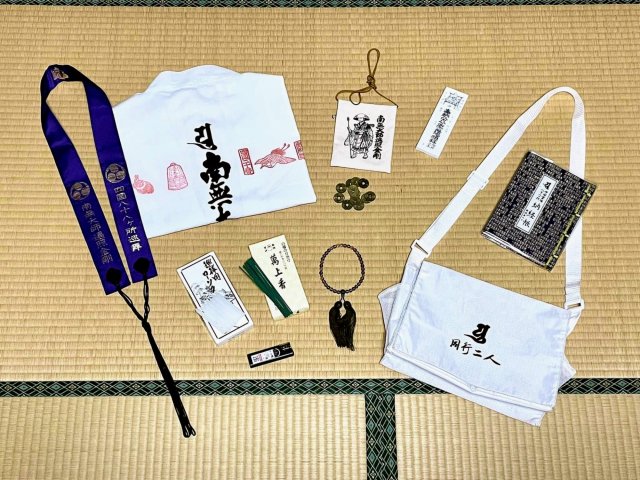- 2022.08.01
-
Pilgrim clothing: Respect, symbolism and hospitality
It is perfectly acceptable to complete all or part of the Shikoku 88 temple pilgrimage in casual attire. However, wearing at least some of the traditional clothing not only shows respect, but also identifies you as a pilgrim. This can lead to unforgettable encounters with fellow pilgrims and local people
Sedge hat (sugegasa)
Perhaps the most recognizable item of pilgrim clothing is the conical sedge hat. In addition to protecting you from the sun, wind and rain, the sedge hat bears the Sanskrit character of “bonji”, which is said to represent Kukai (the Buddhist monk who started the pilgrimage). The character should face the front.
White jacket (hakui)
White represents purity, innocence and equality of all before Buddha. If you have to choose only one traditional item to wear for the pilgrimage, definitely opt for the white jacket! In summer, you can also wear a sleeveless version over everyday clothes. Fun fact! Some pilgrims carry a second jacket on which they collect red stamps from each temple.
Stole (wagesa)
Wagesa is a thin stole worn around the neck, which symbolizes the full Buddhist robe and shows devotion. You can choose the one you like from a variety of colors!
Staff (kongozue)
Although it’s technically not clothing, the wooden staff is an important part of a pilgrim’s kit. In fact, it is said to be the embodiment of Kukai himself guiding you throughout the journey.
Bag (zudabukuro)
The white shoulder bag is useful for carrying a range of items including temple stamp booklet (nokyocho), sutra book, candles, incense and name slips (osamefuda).
While its not mandatory to bring all of these items with you, we particularly recommend the white vest and staff. You might be amazed by the beautiful connections you can make with locals when you've recognizably transformed from a casual visitor to pilgrim
Learn more about the Shikoku 88 temple pilgrimage: https://visitkochijapan.com/en/highlights/henro
Sedge hat (sugegasa)
Perhaps the most recognizable item of pilgrim clothing is the conical sedge hat. In addition to protecting you from the sun, wind and rain, the sedge hat bears the Sanskrit character of “bonji”, which is said to represent Kukai (the Buddhist monk who started the pilgrimage). The character should face the front.
White jacket (hakui)
White represents purity, innocence and equality of all before Buddha. If you have to choose only one traditional item to wear for the pilgrimage, definitely opt for the white jacket! In summer, you can also wear a sleeveless version over everyday clothes. Fun fact! Some pilgrims carry a second jacket on which they collect red stamps from each temple.
Stole (wagesa)
Wagesa is a thin stole worn around the neck, which symbolizes the full Buddhist robe and shows devotion. You can choose the one you like from a variety of colors!
Staff (kongozue)
Although it’s technically not clothing, the wooden staff is an important part of a pilgrim’s kit. In fact, it is said to be the embodiment of Kukai himself guiding you throughout the journey.
Bag (zudabukuro)
The white shoulder bag is useful for carrying a range of items including temple stamp booklet (nokyocho), sutra book, candles, incense and name slips (osamefuda).
While its not mandatory to bring all of these items with you, we particularly recommend the white vest and staff. You might be amazed by the beautiful connections you can make with locals when you've recognizably transformed from a casual visitor to pilgrim
Learn more about the Shikoku 88 temple pilgrimage: https://visitkochijapan.com/en/highlights/henro


